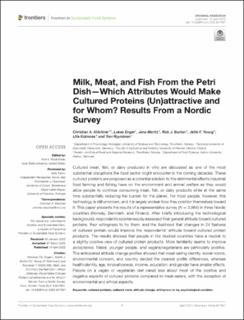| dc.contributor.author | Klöckner, Christian Andreas Nikolaus | |
| dc.contributor.author | Engel, Lukas | |
| dc.contributor.author | Moritz, Jana | |
| dc.contributor.author | Burton, Rob J.F. | |
| dc.contributor.author | Young, Jette F. | |
| dc.contributor.author | Kidmose, Ulla | |
| dc.contributor.author | Ryynänen, Toni | |
| dc.date.accessioned | 2023-05-22T12:01:52Z | |
| dc.date.available | 2023-05-22T12:01:52Z | |
| dc.date.created | 2023-03-07T10:47:11Z | |
| dc.date.issued | 2022 | |
| dc.identifier.citation | Frontiers in Sustainable Food Systems. 2022, 6 . | en_US |
| dc.identifier.issn | 2571-581X | |
| dc.identifier.uri | https://hdl.handle.net/11250/3068523 | |
| dc.description.abstract | Cultured meat, fish, or dairy produced in vitro are discussed as one of the most substantial disruptions the food sector might encounter in the coming decades. These cultured proteins are proposed as a potential solution to the detrimental effects industrial food farming and fishing have on the environment and animal welfare as they would allow people to continue consuming meat, fish, or dairy products while at the same time substantially reducing the burden for the planet. For most people, however, this technology is still unknown, and it is largely unclear how they position themselves toward it. This paper presents the results of a representative survey (N = 3,864) in three Nordic countries (Norway, Denmark, and Finland). After briefly introducing the technological background, respondents spontaneously assessed their general attitude toward cultured proteins, their willingness to try them, and the likelihood that changes in 24 features of cultured protein would improve the respondents' attitude toward cultured protein products. The results showed that people in the studied countries have a neutral to a slightly positive view of cultured protein products. More familiarity seems to improve acceptance. Males, younger people, and vegans/vegetarians are particularly positive. The anticipated attitude change profiles showed that meat-eating identity, social norms, environmental concern, and country yielded the clearest profile differences, whereas health identity, age, innovativeness, income, education, and gender have smaller effects. People on a vegan or vegetarian diet cared less about most of the positive and negative aspects of cultured proteins compared to meat-eaters, with the exception of environmental and ethical aspects. | en_US |
| dc.language.iso | eng | en_US |
| dc.publisher | Frontiers Media S. A. | en_US |
| dc.rights | Navngivelse 4.0 Internasjonal | * |
| dc.rights.uri | http://creativecommons.org/licenses/by/4.0/deed.no | * |
| dc.title | Milk, Meat, and Fish From the Petri Dish—Which Attributes Would Make Cultured Proteins (Un)attractive and for Whom? Results From a Nordic Survey | en_US |
| dc.title.alternative | Milk, Meat, and Fish From the Petri Dish—Which Attributes Would Make Cultured Proteins (Un)attractive and for Whom? Results From a Nordic Survey | en_US |
| dc.type | Peer reviewed | en_US |
| dc.type | Journal article | en_US |
| dc.description.version | publishedVersion | en_US |
| dc.source.pagenumber | 0 | en_US |
| dc.source.volume | 6 | en_US |
| dc.source.journal | Frontiers in Sustainable Food Systems | en_US |
| dc.identifier.doi | 10.3389/fsufs.2022.847931 | |
| dc.identifier.cristin | 2131844 | |
| dc.relation.project | Andre: FUTUREPROTEIN ID-20186 | en_US |
| dc.relation.project | Andre: 201802185 | en_US |
| dc.relation.project | Andre: . 190340 | en_US |
| dc.relation.project | Norges forskningsråd: 294777 | en_US |
| cristin.ispublished | true | |
| cristin.fulltext | original | |
| cristin.qualitycode | 1 | |

